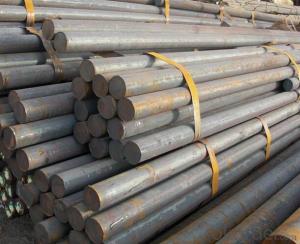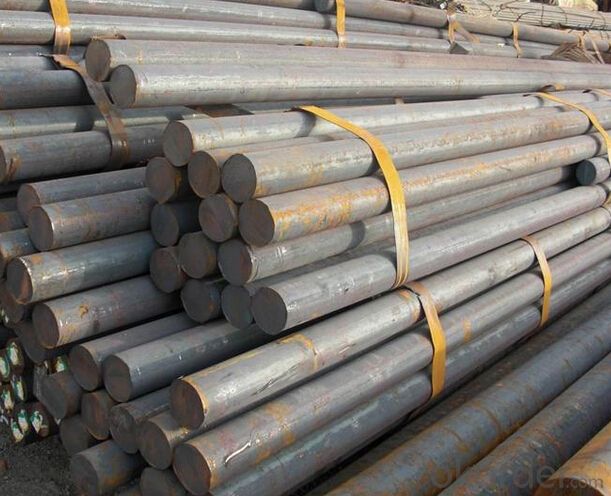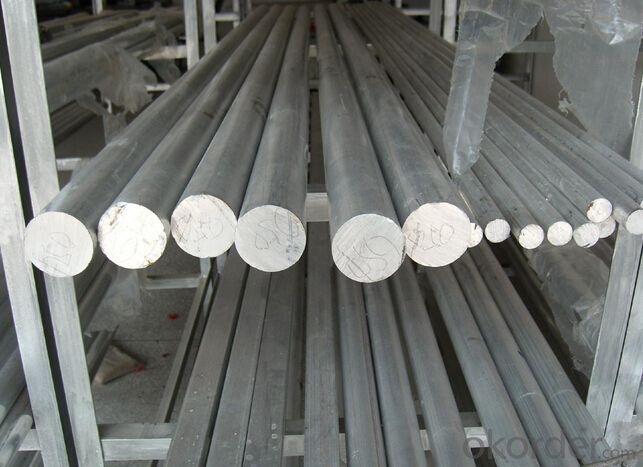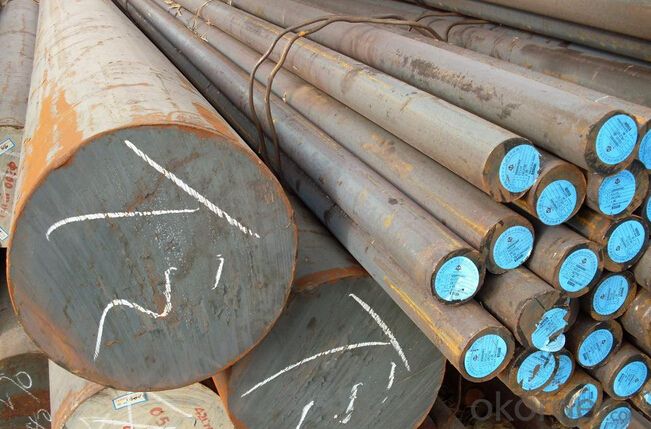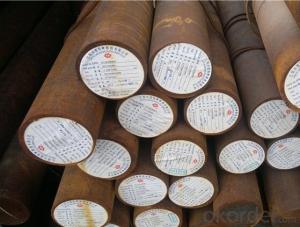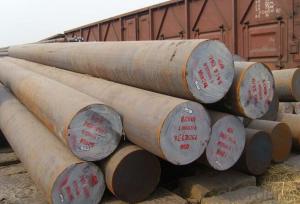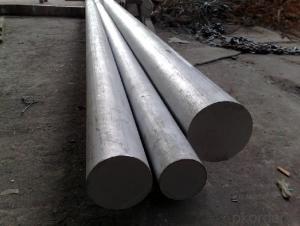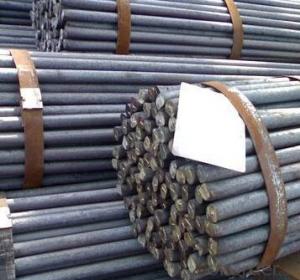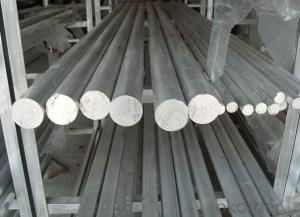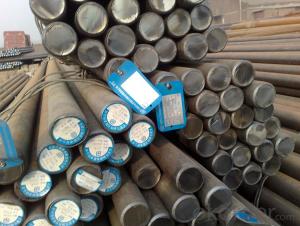Alloy Steel 1.7220/35crmo/SCM435 Tool Steel Special Steel
- Loading Port:
- China main port
- Payment Terms:
- TT OR LC
- Min Order Qty:
- 25 m.t.
- Supply Capability:
- 10000 m.t./month
OKorder Service Pledge
OKorder Financial Service
You Might Also Like
Specification
Chemical Composition(%)
| C | Si | Mn | Cr | Mo | Ni | P | S |
| 0.32-0.40 | 0.20-0.40 | 0.40-0.70 | 0.80-1.10 | 0.15-0.25 | ≤0.30 | ≤0.035 | ≤0.035 |
Standard
| GB | AISI | DIN | JIS | BS |
| 35CrMo | 4137 | 34CrMo4 | SCM432 | 708A37 |
Available Size
| Rolled round bar | φ20-120mm × L |
| Forged round bar | φ130-195mm × L |
Characterstics
| The steel with high strength and toughness, hardenability is better also | |||||||
| After conditioning treatment quenching deformation of small | |||||||
| high fatigue limit and repeated impact resistance |
Applications: The steel is suitable for manufacturing requires a certain strength and toughness of large and medium-sized plastic mold


1, Your advantages?
professional products inquiry, products knowledge train (for agents), smooth goods delivery, excellent customer solution proposale
2, Test & Certificate?
SGS test is available, customer inspection before shipping is welcome, third party inspection is no problem
3, Payment Terms?
30% TT as deposit and 70% before delivery.
Irrevocable L/C at sight.
4, Trading Terms?
EXW, FOB, CIF, FFR, CNF
6, After-sale Service?
We provides the services and support you need for every step of our cooperation. We're the business partner you can trust.
For any problem, please kindly contact us at any your convenient time.
We'll reply you in our first priority within 24 hours.
- Q: Can special steel be used in the power generation equipment manufacturing industry?
- Yes, special steel can be used in the power generation equipment manufacturing industry. Special steel, also known as alloy steel, offers enhanced properties such as high strength, corrosion resistance, and heat resistance. These qualities make it suitable for various components in power generation equipment, including turbines, boilers, and generators, which often operate under extreme conditions. By using special steel, manufacturers can ensure the durability, efficiency, and reliability of the equipment, thus meeting the demanding requirements of the power generation industry.
- Q: What are the main characteristics of alloy steel forgings?
- Alloy steel forgings possess several key characteristics that make them highly desirable in various industries. Firstly, alloy steel forgings are known for their exceptional strength and durability. The inclusion of different alloying elements, such as chromium, nickel, molybdenum, and vanadium, enhances the steel's mechanical properties, making it resistant to wear, fatigue, and corrosion. Another important characteristic of alloy steel forgings is their versatility. These forgings can be customized to meet specific requirements, whether it be in terms of shape, size, or performance. This adaptability allows for the production of complex and intricate components that are often used in critical applications, such as aerospace, automotive, and oil and gas industries. Additionally, alloy steel forgings exhibit excellent heat resistance and can withstand extreme temperature fluctuations without losing their structural integrity. This property is particularly beneficial in applications where components are exposed to high temperatures or rapid temperature changes, such as gas turbines, boilers, and heat exchangers. Furthermore, alloy steel forgings offer superior machinability and weldability, making them easier to work with during the manufacturing process. This characteristic allows for precise shaping, forming, and machining of the forgings, enabling manufacturers to achieve intricate designs and tight tolerances. Lastly, alloy steel forgings are known for their cost-effectiveness. Despite their exceptional properties, alloy steel forgings can be produced in large quantities, resulting in economies of scale. This makes them a cost-efficient choice for various industries looking to balance performance, durability, and affordability. In summary, the main characteristics of alloy steel forgings are their exceptional strength, durability, versatility, heat resistance, machinability, weldability, and cost-effectiveness. These qualities make alloy steel forgings a preferred choice for applications requiring high-performance components that can withstand challenging conditions.
- Q: What are the different cryogenic grades of special steel?
- There are several different cryogenic grades of special steel that are specifically designed to perform well in extremely low temperature environments. These grades are developed to maintain their mechanical properties and resist brittleness at cryogenic temperatures, making them suitable for applications such as liquefied natural gas (LNG) storage tanks, aerospace equipment, and low-temperature chemical processes. One commonly used cryogenic grade of special steel is the 300 series stainless steel, particularly the types 304 and 316. These stainless steels contain nickel, which enhances their cryogenic toughness and resistance to thermal stress. They are often used in the construction of cryogenic storage vessels and piping systems. Another popular cryogenic grade is the 9% nickel steel. This type of steel is alloyed with around 9% nickel, which provides excellent low-temperature toughness and ductility. 9% nickel steel is commonly used in the construction of LNG storage tanks, as it can withstand the extreme cold temperatures required for the storage and transportation of liquefied natural gas. Additionally, there are special low-temperature carbon steels, such as ASTM A350 LF2 and ASTM A333 Grade 6, which are designed to maintain their toughness and impact resistance at cryogenic temperatures. These steels are often employed in low-temperature applications such as cryogenic piping systems and equipment for the oil and gas industry. In summary, the different cryogenic grades of special steel include stainless steels (such as 300 series stainless steel), 9% nickel steel, and low-temperature carbon steels (like ASTM A350 LF2 and ASTM A333 Grade 6). Each grade is specifically engineered to withstand the challenges posed by extremely low temperatures while maintaining their mechanical properties and resistance to brittleness.
- Q: How does special steel perform in abrasive wear applications?
- Special steel performs well in abrasive wear applications due to its high hardness, toughness, and resistance to deformation. It can withstand the constant friction and impact caused by abrasive particles, resulting in minimal wear and extended longevity of the material. Additionally, special steel often has excellent heat resistance, corrosion resistance, and good dimensional stability, making it a reliable choice for abrasive wear applications.
- Q: What are the common failures or issues with special steel?
- Special steel may encounter various failures or problems. Among these, corrosion is a prevalent issue. When exposed to specific environmental conditions, such as moisture or aggressive chemicals, special steel, like any other steel, can be susceptible to corrosion. As a result, its structural integrity and overall performance may decline. Fatigue is another common failure. Special steel is often used in applications that demand strength and durability. However, repetitive loading or stress can cause the material to develop cracks or fractures over time, leading to fatigue failure. This can be particularly troublesome in industries like aerospace or automotive, where components are subjected to constant cyclic loading. Improper heat treatment can also lead to failure. To achieve desired properties like hardness or toughness, special steel often requires specific heat treatments. If the heat treatment process is not executed correctly, it can result in inconsistent material properties, which in turn can reduce performance or cause premature failure. Special steel can also experience welding issues. Welding is frequently employed to join different components or structures made of special steel. However, inadequate adherence to proper welding techniques and procedures can yield defects such as weld cracks, porosity, or inadequate fusion. These defects can weaken the weld joint and compromise the overall structure's integrity. Lastly, dimensional instability can be problematic with special steel. Certain types of special steel, particularly those with high carbon content, may undergo dimensional changes when exposed to temperature variations. This can lead to material distortion or warping, affecting its fit, function, or assembly with other components. To address these failures or issues with special steel, it is crucial to adhere to appropriate material selection, design, manufacturing, and maintenance practices. Thorough inspections, implementation of corrosion protection measures, and ensuring proper heat treatment and welding procedures can help minimize the occurrence of these failures. This, in turn, improves the performance and longevity of special steel components.
- Q: How does the hardness of special steel affect its machinability?
- The hardness of special steel has a significant impact on its machinability. In general, as the hardness of the steel increases, its machinability decreases. Machinability refers to the ease with which a material can be machined or shaped using various machining processes such as cutting, drilling, or milling. Hardness is a measure of a material's resistance to indentation or scratching. It is typically measured using the Rockwell hardness scale or the Brinell hardness test. Special steel, which is known for its high strength and durability, often has a higher hardness compared to other types of steel. When machining special steel, a harder material poses challenges for several reasons. Firstly, harder materials are more difficult to cut, as they require higher cutting forces and generate more heat during the machining process. This can lead to increased tool wear and shorter tool life, resulting in higher production costs. Secondly, hard steel tends to have lower ductility and toughness, making it more prone to cracking or chipping during machining. This can lead to poor surface finish, dimensional inaccuracies, and even component failure. Moreover, the increased hardness of special steel also affects chip formation. Harder materials tend to produce shorter and more segmented chips, which can cause issues with chip evacuation and tool clogging. This can further hinder the machining process and affect the overall productivity. To improve the machinability of hard special steel, various strategies can be employed. The selection of appropriate cutting tools with specific geometries and coatings designed for hard materials is crucial. Additionally, optimizing cutting parameters such as cutting speed, feed rate, and depth of cut can help reduce the negative effects of hardness on machinability. In conclusion, the hardness of special steel has a direct impact on its machinability. As the hardness increases, the machinability decreases due to increased cutting forces, higher tool wear, reduced ductility, and chip formation challenges. However, with proper tool selection and optimization of cutting parameters, the machinability of hard special steel can be improved, enabling efficient and cost-effective machining processes.
- Q: What are the requirements for special steel used in metalworking tools?
- Special steels used in metalworking tools require specific characteristics and qualities to ensure their effectiveness and durability in demanding applications. Some of the key requirements for special steel used in metalworking tools include: 1. High hardness: Special steels used in metalworking tools need to have a high hardness level to resist wear and deformation. This allows the tools to maintain their sharpness and cutting edge for extended periods, resulting in efficient and precise machining operations. 2. Excellent toughness: Metalworking tools are subjected to high impact and stress loads. Therefore, special steels used in these tools must possess excellent toughness to withstand the forces encountered during cutting, drilling, or shaping operations. This toughness prevents the tool from fracturing or chipping, ensuring a longer tool life. 3. Good heat resistance: Metalworking processes generate significant heat due to friction, which can compromise the performance of the tool. Special steels used in metalworking tools should exhibit good heat resistance to minimize the risk of thermal damage, such as softening or loss of hardness, even at elevated temperatures. 4. Wear resistance: The ability to resist wear is crucial for metalworking tools as they are constantly in contact with the workpiece. Special steels used in these tools should have high wear resistance to maintain their cutting performance and dimensional accuracy over time. 5. Corrosion resistance: Metalworking tools are often exposed to harsh environments, including coolants, lubricants, and corrosive elements. Therefore, special steels used in metalworking tools should possess good corrosion resistance to prevent rusting and degradation, ensuring the longevity and reliability of the tools. 6. High dimensional stability: Special steels used in metalworking tools must exhibit high dimensional stability to ensure consistent performance. This stability allows the tools to maintain their shape and size under varying operating conditions, resulting in accurate and repeatable machining processes. 7. Machinability: Special steels used in metalworking tools should be machinable, meaning they can be easily processed and shaped into the desired tool design. This characteristic allows for cost-effective manufacturing, reducing production time and expenses. Meeting these requirements ensures that special steel used in metalworking tools is capable of withstanding the demanding conditions encountered in various metal fabrication and machining operations, providing efficient cutting, shaping, and drilling capabilities while maintaining longevity and performance.
- Q: What are the main advantages of using special steel in aerospace applications?
- The main advantages of using special steel in aerospace applications are its high strength-to-weight ratio, excellent corrosion resistance, and exceptional fatigue resistance. These properties make special steel ideal for withstanding the extreme conditions of aerospace environments, ensuring the safety and longevity of aircraft components. Additionally, special steel can be easily machined and welded, allowing for intricate designs and efficient manufacturing processes in the aerospace industry.
- Q: What are the common applications of special steel?
- Special steel, also known as alloy steel, finds wide usage across various industries owing to its distinct properties and advantages. Some prevalent applications of special steel are as follows: 1. Automotive industry: In the automotive sector, special steel is extensively employed for the production of engine components such as crankshafts, camshafts, connecting rods, and valves. Its exceptional strength, durability, and resistance to wear render it ideal for enduring the rigorous conditions within internal combustion engines. 2. Aerospace industry: The aerospace industry heavily relies on special steel for manufacturing critical components like landing gear, turbine blades, and structural parts. Its remarkable strength-to-weight ratio, excellent heat resistance, and ability to withstand extreme conditions are indispensable in ensuring the safety and reliability of aircraft. 3. Energy industry: The energy sector, particularly power generation, heavily depends on special steel. It is used in the manufacturing of turbine blades, steam pipes, pressure vessels, and other power plant components. Its capacity to endure high temperatures, pressure, and corrosive environments makes it suitable for these demanding applications. 4. Oil and gas industry: Within the oil and gas sector, special steel is extensively utilized in the production of pipes, valves, fittings, and drilling equipment. Its corrosion resistance and high strength guarantee the secure transportation and extraction of oil and gas in harsh environments. 5. Construction industry: Special steel is commonly employed in the construction sector for various purposes. It is used in the manufacturing of reinforcement bars, structural components, and fasteners. Its high tensile strength, durability, and resistance to corrosion make it an ideal choice for withstanding the loads and environmental conditions encountered in construction projects. 6. Tool and die making: Special steel is widely employed in the production of tools and dies. Its high hardness, wear resistance, and toughness make it suitable for manufacturing cutting tools, molds, dies, and other precision components used across various industries. 7. Medical industry: In the medical sector, special steel is used for the production of surgical instruments, implants, and medical devices. Its biocompatibility, corrosion resistance, and sterilization capabilities make it suitable for these critical applications. In conclusion, special steel finds extensive applications in the automotive, aerospace, energy, oil and gas, construction, tool and die making, and medical industries due to its unique properties and ability to withstand demanding conditions.
- Q: How does special steel contribute to the formability of products?
- Special steel, also known as alloy steel, plays a crucial role in enhancing the formability of products. The unique properties and composition of special steel make it an ideal choice for various industries, including automotive, aerospace, and construction. One of the key ways in which special steel contributes to the formability of products is through its exceptional strength and durability. Special steel is engineered to have a higher tensile strength compared to regular steel, which allows it to undergo significant deformation without breaking or cracking. This property enables manufacturers to shape and mold the steel into complex and intricate designs, resulting in products with enhanced formability. Additionally, special steel offers excellent resistance to deformation, known as elastic deformation. This means that even after undergoing significant stress or strain, the steel can return to its original shape, reducing the risk of permanent deformation. This characteristic is especially beneficial in applications where products need to withstand repeated bending or shaping without losing their structural integrity. Moreover, special steel often contains specific alloying elements such as chromium, nickel, or molybdenum, which further improve its formability. These alloying elements enhance the steel's ability to be easily formed and manipulated, making it more ductile and reducing the risk of cracking during the forming process. Furthermore, special steel can be heat-treated to modify its mechanical properties and enhance its formability. Through various heat treatment processes such as annealing or quenching, the steel can be made more malleable, allowing it to be easily shaped and formed into desired products. Overall, special steel plays a crucial role in improving the formability of products due to its exceptional strength, resistance to deformation, alloying elements, and heat-treatability. These properties enable manufacturers to create products with intricate designs and complex shapes, meeting the diverse needs of different industries while ensuring durability and structural integrity.
Send your message to us
Alloy Steel 1.7220/35crmo/SCM435 Tool Steel Special Steel
- Loading Port:
- China main port
- Payment Terms:
- TT OR LC
- Min Order Qty:
- 25 m.t.
- Supply Capability:
- 10000 m.t./month
OKorder Service Pledge
OKorder Financial Service
Similar products
Hot products
Hot Searches
Related keywords
